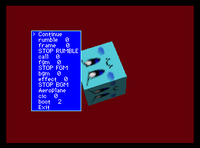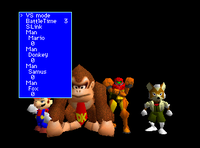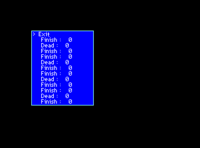Debug menu (SSB): Difference between revisions
mNo edit summary |
PeabodySam (talk | contribs) m (→BGM) |
||
| Line 72: | Line 72: | ||
|- | |- | ||
| 0 || | | 0 || {{SSBMusicLink|10|Pop Land Stage}} | ||
|- | |- | ||
| 1 || | | 1 || {{SSBMusicLink|8|Planet Zebes Stage}} | ||
|- | |- | ||
| 2 || | | 2 || {{SSBMusicLink|13|Ancient Kingdom Stage}} | ||
|- | |- | ||
| 3 || | | 3 || {{SSBMusicLink|14|Ancient Kingdom Stage (Finale)}} | ||
|- | |- | ||
| 4 || | | 4 || {{SSBMusicLink|11|Sector Z Stage}} | ||
|- | |- | ||
| 5 || | | 5 || {{SSBMusicLink|6|Congo Jungle Stage}} | ||
|- | |- | ||
| 6 || | | 6 || {{SSBMusicLink|5|Peach's Castle Sky Stage}} | ||
|- | |- | ||
| 7 || | | 7 || {{SSBMusicLink|12|Yamabuki City Stage}} | ||
|- | |- | ||
| 8 || | | 8 || {{SSBMusicLink|9|Yoshi's Island Stage}} | ||
|- | |- | ||
| 9 || | | 9 || {{SSBMusicLink|7|Hyrule Castle Stage}} | ||
|- | |- | ||
| 10 || | | 10 || {{SSBMusicLink|N/A|Character Select}} | ||
|- | |- | ||
| 11 || [[ | | 11 || [[Music (SSB)#Trivia|Unused Fanfare]] | ||
|- | |- | ||
| 12 || [[Victory_theme#Super_Mario_Bros._Victory_Theme|Mario's and Luigi's victory theme]] | | 12 || [[Victory_theme#Super_Mario_Bros._Victory_Theme|Mario's and Luigi's victory theme]] | ||
| Line 116: | Line 116: | ||
| 21 || [[Victory_theme#The_Legend_of_Zelda_Victory_Theme|Link's victory theme]] | | 21 || [[Victory_theme#The_Legend_of_Zelda_Victory_Theme|Link's victory theme]] | ||
|- | |- | ||
| 22 || | | 22 || {{SSBMusicLink|25|Battle Results}} | ||
|- | |- | ||
| 23 || | | 23 || {{SSBMusicLink|30|Ending Point (Intro)}} | ||
|- | |- | ||
| 24 || | | 24 || {{SSBMusicLink|31|Ending Point (Master Hand Appearance)}} | ||
|- | |- | ||
| 25 || | | 25 || {{SSBMusicLink|32|Ending Point}} | ||
|- | |- | ||
| 26 || | | 26 || {{SSBMusicLink|33|Bonus Game}} | ||
|- | |- | ||
| 27 || | | 27 || {{SSBMusicLink|42|Ending}} | ||
|- | |- | ||
| 28 || | | 28 || {{SSBMusicLink|36|Bonus Game (Clear)}} | ||
|- | |- | ||
| 29 || | | 29 || {{SSBMusicLink|35|All Clear}} | ||
|- | |- | ||
| 30 || | | 30 || {{SSBMusicLink|37|Lose Bonus Game}} | ||
|- | |- | ||
| 31 || | | 31 || {{SSBMusicLink|43|Continue}} | ||
|- | |- | ||
| 32 || | | 32 || {{SSBMusicLink|44|Game Over}} | ||
|- | |- | ||
| 33 || | | 33 || {{SSBMusicLink|1|Opening}} | ||
|- | |- | ||
| 34 || | | 34 || {{SSBMusicLink|2|How to Play}} | ||
|- | |- | ||
| 35 || | | 35 || {{SSBMusicLink|29|Meta Crystal (Intro)}} | ||
|- | |- | ||
| 36 || | | 36 || {{SSBMusicLink|38|Duel Zone}} | ||
|- | |- | ||
| 37 || | | 37 || {{SSBMusicLink|39|Meta Crystal}} | ||
|- | |- | ||
| 38 || | | 38 || {{SSBMusicLink|42|Ending}} | ||
|- | |- | ||
| 39 || | | 39 || {{SSBMusicLink|45|Staff Roll}} | ||
|- | |- | ||
| 40 || | | 40 || {{SSBMusicLink|41|The Prize}} | ||
|- | |- | ||
| 41 || | | 41 || {{SSBMusicLink|40|A Character Appears}} | ||
|- | |- | ||
| 42 || | | 42 || {{SSBMusicLink|28|Training Mode}} | ||
|- | |- | ||
| 43 || | | 43 || {{SSBMusicLink|3|Character Introduction Stage}} | ||
|- | |- | ||
| 44 || | | 44 || {{SSBMusicLink|4|Menu Screen}} | ||
|- | |- | ||
| 45 || | | 45 || {{SSBMusicLink|26|Hammer}} | ||
|- | |- | ||
| 46 || | | 46 || {{SSBMusicLink|27|Starman}} | ||
|} | |} | ||
Revision as of 12:50, November 26, 2019
- For GameShark codes used to access the Debug Menu, see here.
The debug menus are elements of development that were accidentally left in Super Smash Bros. There are four menus: System debug, Battle debug, Falls debug, and Unknown debug. Within these menus, the player has control over various aspects of the game, including non-playable characters, non-playable stages, single player stages and more. In order to get to the debug menus, a GameShark device must be used.
This menu contains various out of battle functions. Within it, one can play every sound and piece of music in the game and view every transition. Sadly, these two options appear to be the only ones that still function correctly. The others appear to do nothing.
| Menu item | Description | Values |
|---|---|---|
| Continue | Makes the menu disappear. It reappears if "start" is pressed. | — |
| rumble | Has no function in the final release, but was presumably for testing rumble intensities. | Min=0; Max=10; Increment=1 |
| frame | Has no known function. | Min=0; Max=8000; Increment=1 |
| STOP RUMBLE | Has no function in the final release, but was presumably for stopping rumbling caused by the "rumble" option. | — |
| call | Plays characters' crowd chants. | Min=0; Max=11; Increment=1
|
| fgm | Plays the various sound effects in the game. |
|
| STOP FGM | Stops all sound effects. | — |
| bgm | Plays the various background music in the game. | Min=0; Max=46; Increment=1 (See here.) |
| effect | Applies an effect to the background music. | Min=0; Max=5; Increment=1 |
| STOP BGM | Stops all background music. | — |
| (Transition) | Executes the game's various transitions. Scroll through them with left and right on the control stick |
|
| cic | Has no known function. | Min=0; Max=255; Increment=1 |
| boot | Has no known function. | Min=0; Max=255; Increment=1 |
| Exit | Exits to the title screen. | — |
BGM
This menu contains options for starting 1P Game and Versus Mode matches. Characters such as Master Hand and Metal Mario can be selected here, and they can play on each stage in the game, including Meta Crystal and Battlefield. Pressing start begins the match.
| Menu item | Description |
|---|---|
| (Mode) | Sets the game mode. |
| BattleTime | Sets how much time (in minutes) that a versus match will last. |
| S | Sets the 1P Game stage that the player should start on. |
| (P1 Type) | Sets Player 1's player type. |
| (P1 Character) | Sets Player 1's character. |
| (P1 Color) | Sets Player 1's alternate costume. |
| (P2 Type) | Sets Player 2's player type. |
| (P2 Character) | Sets Player 2's character. |
| (P2 Color) | Sets Player 2's alternate costume. |
| (P3 Type) | Sets Player 3's player type. |
| (P3 Character) | Sets Player 3's character. |
| (P3 Color) | Sets Player 3's alternate costume. |
| (P4 Type) | Sets Player 4's player type. |
| (P4 Character) | Sets Player 4's character. |
| (P4 Color) | Sets Player 4's alternate costume. |
Modes
| Mode | Description |
|---|---|
| VS mode | Starts a normal Versus Mode match using the 4 specified characters. |
| 1P mode | Starts a 1P Game using player 1's character . |
| Staffroll | Plays the ending credits. |
| Explain | Plays the "How to Play" video. |
| AutoDemo | Plays the battle demo when the How to Play video ends. |
| Congra | Shows the congratulations screen of player 1's character. |
Characters
| Debug name | Character | Notes |
|---|---|---|
| Mario | ||
| Fox | ||
| Donkey | ||
| Samus | ||
| Luigi | ||
| Link | ||
| Yoshi | ||
| Captain | ||
| Kirby | ||
| Pikacyu | ||
| Purin | Purin is Jigglypuff's Japanese name | |
| Nes | ||
| Boss | ||
| Metal | ||
| NMario | ||
| NFox | ||
| NDonkey | ||
| NSamus | ||
| NLuigi | ||
| NLink | ||
| NYoshi | ||
| NCaptain | ||
| NKirby | ||
| NPikacyu | ||
| NPurin | ||
| NNes | ||
| GDonkey |
Player types
| Type | Description |
|---|---|
| Man | A human controlled player. |
| Com | A computer controlled player. |
| Not | The slot is empty, no character will appear. |
| Demo | Movement will be static, and the character intro will be glitched. The character cannot be interacted with in any way |
| Key | Movement will be static. Will cause the animation of entering the stage to be glitched, almost similarly to the above. |
| GameKey |
Stages
| Debug name | Stage name | In-game usage | Description |
|---|---|---|---|
| Mario | Peach's Castle | Playable Stage | |
| Fox | Sector Z | Playable Stage | |
| Donkey | Congo Jungle | Playable Stage | |
| Samus | Planet Zebes | Playable Stage | |
| Link | Hyrule Castle | Playable Stage | |
| Yoshi | Yoshi's Island | Playable Stage | |
| Kirby | Dream Land | Playable Stage | |
| Pikacyu | Saffron City | Playable Stage | |
| OldMario | Mushroom Kingdom | Playable Stage | |
| Small | — | None- Debug Menu Only | A mostly flat stage similar to Dream Land in visuals and layout. |
| New | — | None- Debug Menu Only | A sister stage to "Small". This one has a modified layout. |
| Explain | — | How to Play | The stage used during the How to Play video. |
| SYoshi | — | 1P Game | The stage used during the second match in the 1P Game. It is a clone of Yoshi's Island, except that the clouds are absent. |
| Metal | Meta Crystal | 1P Game | The stage used during the Metal Mario fight in the 1P Game. |
| Zako | Battlefield | 1P Game | The stage used during the Fighting Polygon Team fight in the 1P Game. |
| Bonus3 | Race to the Finish | 1P Game | The stage used during the "Race to the Finish" bonus round in the 1P Game. |
| Boss | Final Destination | 1P Game | The stage used during the Master Hand fight in the 1P Game. Crashes the game if the stage is called through the debug menu. |
| Bonus1(CHAR) | Target Test | Bonus 1 Practice, 1P Game | The stages used for the "Target Test" bonus game. There is one for each character. The game crashes if these stages are called through the debug menu. |
| Bonus2(CHAR) | Board the Platforms | Bonus 2 Practice, 1P Game | The stages used for the "Board the Platforms" bonus game. There is one for each character. The game crashes if these stages are called through the debug menu. |
"S" Stages
This option is only active if the mode is set to "1P Game". It sets which event to place player 1 in. This includes 1P Game stages and challenger approaching events.
| 1P Game stages | ||
|---|---|---|
| Debug name | Opponents/Objective | Stage |
| S:Link | Hyrule Castle | |
| S:Yoshi | SYoshi | |
| S:Fox | Sector Z | |
| S:Bonus1 | Break the Targets | Bonus1(CHAR) |
| S:MarioBros | Peach's Castle | |
| S:Pikacyu | Saffron City | |
| S:GDonkey | Congo Jungle | |
| S:Bonus2 | Board the Platforms | Bonus2(CHAR) |
| S:Kirby | Dream Land | |
| S:Samus | Planet Zebes | |
| S:Metal | Meta Crystal | |
| S:Bonus3 | Race to the Finish | Bonus3 |
| S:Zako | Battlefield | |
| S:Boss | Final Destination | |
| Challenger approaching events | ||
| Debug name | Opponent | Stage |
| S:Luigi | Peach's Castle | |
| S:Nes | Dream Land | |
| S:Purin | Saffron City | |
| S:Captain | Planet Zebes | |
A very unstable menu, the Falls debug menu was most likely used to test the results screen, although it does nothing now. The game may randomly crash upon loading this menu for no known reason. There are 12 options in the menu, 3 for each character. Finish is repeated twice per character. The top one will crash the game if scrolled past 4. The bottom one can go out to 65536. Dead also ranges from 0 to 65536. If "A" is pressed, the battle debug menu is loaded, although changes made to the Falls debug menu appear not to affect the match or results screen in any way.
This mysterious menu appears to have no function whatsoever. It lacks the interface found in the other 3 menus and appears to respond randomly to any button presses, throwing overlapping UI elements on the screen. This menu differs considerably from version to version.
Trivia
- Super Smash Bros.'s debug menu contains two voice clips of Ness, one saying "PK" and another saying "Starstorm", as well as another clip of Captain Falcon saying "Come on!" (similarly to the start of his Blue Falcon move), suggesting that Final Smashes were originally intended to appear in the game. Masahiro Sakurai later confirmed in an interview that he did intend to implement Final Smashes in Super Smash Bros., and that the voice clips were intended for that purpose.
| Super Smash Bros. menu items | |
|---|---|
| VS Mode | VS Start (Team Battle) · Rule · Time / Stock · VS Options |
| 1P Mode | 1P Game · Training Mode · Bonus 1 Practice · Bonus 2 Practice |
| Option | Sound · Screen Adjust · Backup Clear |
| Data | Characters · VS Record · Sound Test |
| Unused | Debug menu |




